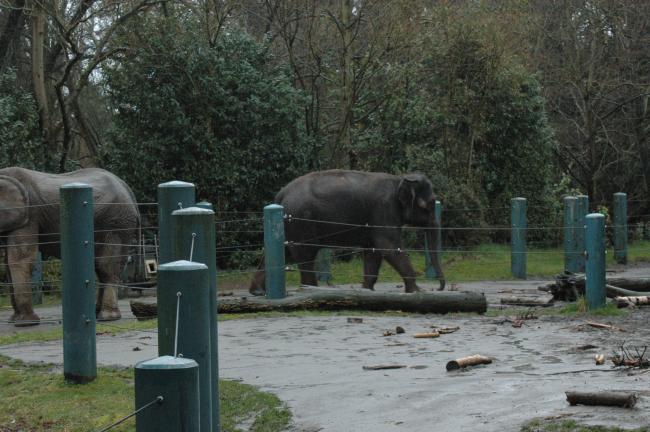In close quarters: local activists continue to demand more space for the Woodland Park Zoo elephants
Bamboo and Watoto do not get along, so they must be separated while Chai will be in a pen with either one of them. Pictures here: Watoto (left) and Chai (right).
Tue, 03/29/2011
By Christy Wolyniak, News Intern
Elephants are an educational addition to the Woodland Park Zoo; however, there have been ongoing complaints that the condition and treatment these elephants endure is abuse.
Watoto age 41, Chai age 31, and Bamboo age 44, have been at WPZ since they were one-year-olds and have adapted to zoo life. According to the WPZ website, elephants nurse until they are two-and-a-half to three years old.
One of the main complaints against WPZ is that the three elephants endure solitary confinement and a lack of social experience.
With roughly one acre of yard space outside, these elephants have four pens to roam in and their heated indoor barn is divided into four separate holding areas, according to the zoo's website.
Iain Douglas-Hamilton once wrote in a National Geographic article that elephants travel for three things: sex, sustenance and safety.
“We have all of that here – the elephant’s travel is resource-based and we are always looking for ways to enhance that,” said WPZ's elephant curator, Bruce Upchurch. “What we have now is enough. We have quality space, it’s just the amount that’s the issue.”
Alyne Fortgang, co-founder of the Friends of the Woodland Park Zoo Elephants, doesn't agree.
“After years of having people take pictures and staring at them, these elephants have become living shells of a being," she said. "They look like zombies, exude little emotion, and hardly even act alive compared to wild elephants that are in movement 20 hours a day.”
The WPZ structures exercise and enrichment plans for the elephants, including food games and items to push and pull such as logs.
The zoo’s website also states that the elephants have “outdoor access 365 days a year. Most of the year, elephants are generally given free choice to outdoor access 23 hours a day, while approximately an hour is spent in the barn for routine baths, training and husbandry procedures.”
“In the past three and a half years observing the elephants, beginning in October to early May, they are brought into the barn at 3:30 or 4 p.m. in the afternoon until 8 or 8:30 a.m. the next morning. [The elephants face] 16-17 hours a day of solitary confinement,” said Fortgang.
Upchurch notes that the elephants are brought in depending on the weather. In order to meet AZA standards, they must be brought in when temperatures reach below 40 degrees. However, Fortgang notes that they have been brought into the barn when temperatures have been above the minimum temperature.
As social creatures, elephants naturally form a matriarchal society, according to Upchurch. But it has been said that Bamboo and Watoto do not get along, so they must be separated while Chai will be in a pen with either one of them.
According to Gigi Allianic, WPZ Public Relations Manager, the elephants still relate well even though the three females are of different species, because they have grown up together. The zoo is driven by social grouping. Elephants live a long time and the WPZ is in the process of setting up a matriarchal society by being active in Species Survival Plans.
On Tuesday, March 15, 2011, Chai was artificially inseminated for what Upchurch said was the eighth time. Activists state that Chai has been inseminated 60 times. Upchurch contradicts this idea, stating that the procedures before were just “A.I. attempts which were strictly experimental and the procedures were never successful.”
Hansa, Chai’s last calf, contracted an elephant herpes virus and died at the age of 6 ½. “Losing Hansa was crushing. What we know about herpes now we didn’t know 3 or 4 years ago,” said Upchurch.
“Children are learning to look upon suffering as entertainment. The zoo is teaching them that it’s acceptable to confine these animals for entertainment,” said Fortgang.
The elephants at the Woodland Park Zoo create a positive learning environment for children and the community, according to Upchurch and Allianic. Zoo elephants educate the community about elephant conservation in other countries. WPZ is an active participant in projects such as the Schools’ Awareness Program, which has reached 750 schools in the last four years to raise awareness about human-to-elephant conflict in Sri Lanka.
“Everything we’ve learned about the elephants in the zoo [have helped us] learn about the elephants in the wild,” said Allianic.
The Elephant Sanctuary in Tennessee has offered to take the three elephants to their spacious sanctuary to be with other elephants. However, WPZ does not believe their elephants would do well there.
“The Tennessee sanctuary is for old, needy elephants who are struggling. They don’t have the same type of care, expertise, or mission that we do here [at WPZ]. It is not the best place [for our elephants],” said Upchurch.
For more information regarding the elephants at the WPZ, please visit the zoo's website at www.zoo.org or the Friends of the Woodland Park Zoo website at www.freewpzelephants.com.


